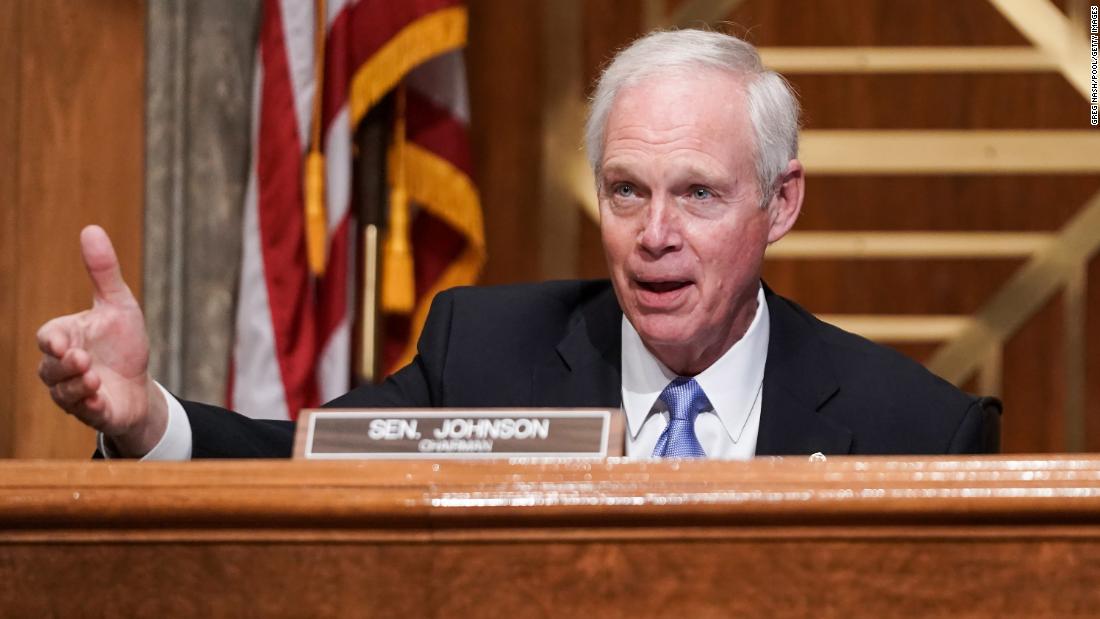
“I believe America is in peril,” Johnson wrote in a Wall Street Journal op-ed. “Much as I’d like to ease into a quiet retirement, I don’t feel I should.”
Why is that notable? For two — interconnected reasons: 1) Johnson’s Wisconsin seat will be one of Democrats’ top 2022 targets and 2) Johnson is, by far, the leading conspiracy theorist in the Senate.
Let’s tackle that second point first, with a look at just some of the conspiracy theories that Johnson has embraced in recent years.
* Johnson suggested that House Speaker Nancy Pelosi (and House Democrats) voted to impeach Donald Trump for his role in the January 6 riot at the US Capitol as a way to cover up her own culpability for what happened that day. (There’s no evidence to back up that claim.)
* Johnson said that he saw no evidence that January 6 was an “armed insurrection.” (There’s lot of evidence it was.)
* In a Senate hearing on the Capitol attack, Johnson read excerpts of a piece by J. Michael Waller, which ran in The Federalist on January 14, claiming that “a small number of cadre appeared to use the cover of a huge rally to stage its attack,” and suggesting that these “agents-provocateurs” were a) not Trump supporters and b) were primarily responsible for the violent storming of the Capitol. *There’s zero evidence to back up that claim.)
* Johnson told a crowd that mouthwash was a potentially effective treatment to combat being infected with Covid. “By the way, standard gargle mouthwash, has been proven to kill the coronavirus,” Johnson said, according to a report in Newsweek. “If you get it, you may reduce viral replication. Why not try all these things?” (Nope!)
* Just days ago, Johnson said this about natural immunity versus the vaccine: “Why have we assumed that the body’s natural immune system isn’t the marvel that it actually is…. Why do we think that we can create something better than God in terms of combating disease?” (Again, no.)
Johnson’s tendency to not only believe but promote these sorts of conspiracies has led many Democrats to hope that he would run for reelection — under the belief that it would give them a better chance to win the seat than if Johnson kept his two term pledge and retired.
Even before Johnson’s announcement over the weekend, there were more than a half dozen Democrats actively running — including Lt. Gov. Mandela Barnes, state Treasurer Sarah Godlewski and Milwaukee Bucks executive Alex Lasry.
You might think that Johnson’s full embrace of Trumpism — and all of its attendant conspiracy theories — would doom his chances of winning a third term in one of the swingiest states in the country. And, Johnson’s poll numbers are, well, not great. In a November Marquette Law School poll, just 1 in 3 (36%) of the state’s residents had a favorable opinion of Johnson while 42% had an unfavorable one. (Another 1 in 5 voters didn’t know enough about Johnson to offer an opinion.)
Numbers like those are not good for any incumbent less than a year away from a reelection race. But, as Charlie Sykes, a longtime Wisconsin conservative hand, writes in a recent piece on The Bulwark, he considers the incumbent to be the favorite. Here’s the key bit:
“Ronjon has to be considered the favorite for three reasons: (1) the national political environment, (2) the track record of ‘out-party’ incumbents in midterm elections in Wisconsin, and (3) the very real chance that Democrats will nominate a weak (read ‘unelectable’) challenger.”
Which is all worth remembering. After all, Democrats thought they had beaten Johnson in 2016 when they recruited former Sen. Russ Feingold into the race. But Johnson beat Feingold 50% to 47%.
The real question in the race may well be how much (or little) Wisconsin voters care about Johnson’s flights of fancy — and whether the eventual Democratic nominee can effectively use it to cast Johnson’s as out of step with the state’s voters.
One thing is clear: Johnson has provided lots and lots of fodder for that attack.



